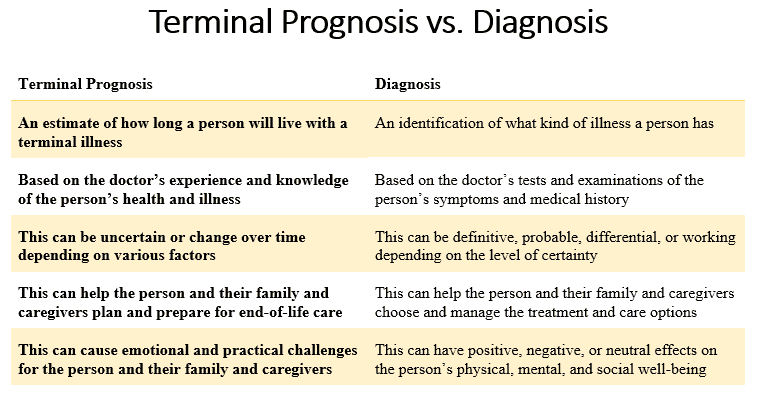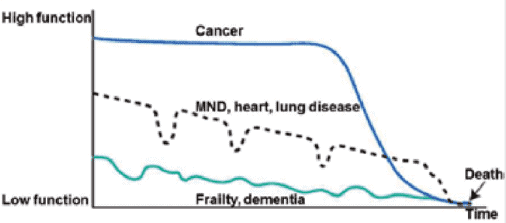Introduction to Terminal Illness and Progressive Diseases
Published on May 2, 2024
Updated on May 26, 2024
Published on May 2, 2024
Updated on May 26, 2024

Table of Contents
When a loved one is diagnosed with a terminal illness or a progressive disease, it can be a daunting and overwhelming experience for families and caregivers. Understanding the terms and concepts associated with these conditions is essential to providing the best possible care and support. This article aims to clarify the complex journey of terminal illnesses and progressive diseases, offering guidance and compassion to those navigating this challenging path.
A terminal prognosis is a medical estimation that a person’s life expectancy is six months or less. This prognosis is not a precise prediction but a preparation for the uncertain future. It allows families to make the most of their time together, arrange for necessary care and support, and cherish every moment. Understanding the terminal prognosis enables families to focus on comfort, quality of life, and dignity during the remaining time.
Progressive diseases, such as certain dementias, advanced heart failure, or severe lung disease, gradually worsen over time. While these conditions may not be terminal at diagnosis, they can eventually become so. Recognizing the progression of these diseases helps families anticipate and adapt to the changes they bring, ensuring they’re ready to provide the necessary care and support. By understanding the journey of progressive diseases, families can offer meaningful support and make informed decisions when they matter most.
Chronic diseases are ongoing conditions that often require long-term management. In some cases, these conditions may become terminal, indicating that they could lead to the end of life. The progression from chronic to terminal is unique to each individual, and understanding this journey enables families to offer the proper support and make meaningful decisions. This knowledge helps families navigate the complex emotional and practical aspects of caring for a loved one with a terminal illness.
Receiving a terminal prognosis can be a life-altering moment for families. It’s essential to understand that this prognosis is not a prediction but a preparation for the unpredictable future. It means that, based on medical knowledge, a person’s journey might be coming to a close within a specific time frame. This understanding allows families to focus on comfort, quality of life, and dignity during the remaining time, making every moment count.
Doctors use a comprehensive evaluation to determine if someone is in a terminal state, which means a prognosis of six months or less to live. This evaluation considers the progression of the disease, the body’s response to treatment, and overall health. While this evaluation is not an exact science, it helps plan the best care possible, focusing on comfort and quality of life. Understanding the medical criteria for a terminal prognosis empowers families to make informed decisions and provide the necessary support.
Hospice and palliative care are essential components of supporting individuals with terminal illnesses. These services focus on comfort, not cure, and can start earlier in the disease process. Hospice care is provided when treatment is no longer effective, and the goal is to make every day as good as possible. Palliative care helps with pain and stress management, supporting the family as well. Both services prioritize comfort, dignity, and quality of life, making them invaluable resources for families and caregivers.
This section is dedicated to understanding how certain diseases progress over time and what it means when they reach a terminal stage. It’s written with care to help family members and caregivers comprehend these complex concepts, focusing on empathy and compassion. While it’s not an exhaustive list of progressive diseases that become terminal, it provides a comprehensive overview of the most common conditions, including dementia, heart failure, COPD, cirrhosis, and Parkinson’s disease.

Dementia is like a fog that slowly rolls in, affecting memory and thinking. Over time, it can lead to a person needing help with daily life. In its final stages, dementia becomes terminal, and the focus shifts to comfort and quality of life rather than treatment.
Stage IV heart failure is when the heart can’t pump enough blood for the body’s needs. It’s a severe condition that can become terminal. At this stage, treatments aim to ease symptoms and improve quality of life as much as possible.
COPD, or chronic obstructive pulmonary disease, makes breathing hard. In its end stage, it can become terminal. Oxygen therapy and other treatments can help, but the goal is to make breathing easier and the person more comfortable.
Cirrhosis is scarring of the liver from long-term damage. When it’s in the end stage, the liver can’t do its job well, which can be terminal. Treatments focus on managing symptoms and complications.
Parkinson’s disease affects movement, causing tremors and stiffness. As it progresses, it can lead to severe complications that can be terminal. Care at this stage aims to maintain comfort and dignity.
As a loved one nears the end of their life, it’s a tender and emotional time for families. This section is written to help families notice the signs that this stage is approaching, enabling them to offer love, comfort, and support. Physical changes, such as increased sleeping, decreased appetite, and breathing difficulties, can indicate that the end of life is near. Behavioral and cognitive signs, like confusion and difficulty recognizing familiar faces, are also common. Emotional and social indicators, such as withdrawal from social activities, can signal that the end of life is approaching. Understanding Terminal Illness Progression: Observable Signs And Symptoms and Identifying Patients Who May Benefit from Hospice Care: A Visual Observation Guide for Personal Care Facilities are helpful articles that go into more depth about how you can visually tell when someone may be appropriate for hospice.
This section is a gentle guide for families and caregivers, guiding what to expect and how to be there for someone nearing the end of their life journey. It’s about understanding the signs, providing comfort and support, and preparing for the end of life. Recognizing terminal signs without medical equipment, providing comfort and support, and preparing for the end of life are all essential aspects of caring for a loved one with a terminal illness.
Hospice care is a special kind that focuses on the quality of life for people experiencing an advanced, life-limiting illness whose terminal prognosis is six months or less to live. To be eligible for hospice care, a doctor must certify that a person is likely in the last six months of their life. This care is provided in various settings, including at home, a hospice center, or a hospital. Hospice care aims to support patients and families, focusing on comfort, dignity, and quality of life.
Reaching the end of a journey with a terminal illness is a profoundly personal experience. It’s a time when dignity and respect are more important than ever. Embracing this stage means accepting the natural process of life with grace, ensuring that the loved one feels valued, heard, and comfortable. Small gestures, soothing words, and maintaining their preferences and routines can all contribute to preserving their dignity. Resources and support systems are available to help families and caregivers navigate this challenging path, providing practical advice, emotional support, and a listening ear when needed.
Top 30 FAQs About Hospice: Everything You Need to Know
Understanding Hospice Care: Is it Too Early to Start Hospice?
What’s the process of getting your loved one on hospice service?
Picking a hospice agency to provide hospice services
National Hospice Locator and Medicare Hospice Compare
CaringInfo – Caregiver support and much more!
Surviving Caregiving with Dignity, Love, and Kindness
Caregivers.com | Simplifying the Search for In-Home Care
As an Amazon Associate, I earn from qualifying purchases. The amount generated from these “qualifying purchases” helps to maintain this site.
Take Back Your Life: A Caregiver’s Guide to Finding Freedom in the Midst of Overwhelm
The Conscious Caregiver: A Mindful Approach to Caring for Your Loved One Without Losing Yourself
Everything Happens for a Reason: And Other Lies I’ve Loved
Final Gifts: Understanding the Special Awareness, Needs, and Communications of the Dying
As an Amazon Associate, I earn from qualifying purchases. The amount generated from these “qualifying purchases” helps to maintain this site.
Cancer Caregiving A-to-Z: An At-Home Guide for Patients and Families
Things I Wish I’d Known: Cancer Caregivers Speak Out
Trivia Games – Caregiver Activities for Alzheimer’s and Dementia
As an Amazon Associate, I earn from qualifying purchases. The amount generated from these “qualifying purchases” helps to maintain this site.
Dementia Caregiver Essentials: Comprehensive Guide for Dementia Care (one book that contains the ten books below for less than one-third the price of all ten)
Holistic Nurse: Skills for Excellence book series
Dementia Home Care: How to Prepare Before, During, and After
Atypical Dementias: Understanding Mid-Life Language, Visual, Behavioral, and Cognitive Changes
Fading Reflection: Understanding the complexities of Dementia
Ahead of Dementia: A Real-World, Upfront, Straightforward, Step-by-Step Guide for Family Caregivers
Four Common Mistakes by Caregivers of Loved Ones with Dementia and What Do Differently (video)
Providing Comfort During the Last Days of Life with Barbara Karnes RN (YouTube Video)
Preparing the patient, family, and caregivers for a “Good Death.”
Velocity of Changes in Condition as an Indicator of Approaching Death (often helpful to answer how soon? or when?)
The Dying Process and the End of Life
As an Amazon Associate, I earn from qualifying purchases. The amount generated from these “qualifying purchases” helps to maintain this site.
Gone from My Sight: The Dying Experience
The Eleventh Hour: A Caring Guideline for the Hours to Minutes Before Death